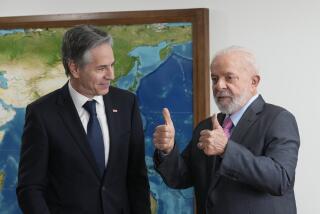IMF Official in Brazil to Spur Talks on Aid
- Share via
BRASILIA, Brazil — Stanley Fischer, the first deputy managing director of the International Monetary Fund, will visit Brazil today to “speed up” talks over the release of the next payment from a $41.5-billion aid package for the South American nation.
Fischer will join an IMF team that arrived in the Brazilian capital during the weekend to assess Brazil’s compliance with terms of the aid package, announced in November.
During closed-door meetings Sunday, Brazilian officials presented the country’s economic balance sheet for 1998 and discussed its progress on the IMF-sponsored reform program, set down as criteria for the loan package.
Economists said the collapse of Brazil’s currency, the real, had raised fears that Brazil might default on its now more expensive debt, a nightmare scenario that is fueling ongoing concern about its shaky economy--despite successes in its Congress in pushing through some fiscal reforms.
The fragile real has now lost about 40% of its value since the government eased its rigid foreign exchange policy and allowed the currency to float on Jan. 13.
Since then, Fischer said on Sunday, Brazil has done “the great bulk” of what’s needed to strengthen its fiscal position.
Fischer, speaking at a panel during the annual meeting of the World Economic Forum in Davos, Switzerland, said Brazil still needs a “credible monetary policy” to prevent the recent devaluation of the currency from sparking inflation. “That requires a clear monetary policy that is believed by the markets,” he said.
Fischer said the real has fallen too far and will recover. “This crisis can be handled quite well,” he said. There is “no doubt that the IMF would work with Brazil to get out of its present difficulties,” he said.
He said Brazil’s monetary problems are “much smaller than [those of] some of the Asian countries” because “the underlying banking situation is stronger.”
Since the crisis broke, Fischer said, “Brazil has put in place most of the fiscal measures that we agreed in December.”
Earlier Sunday, a leading U.S. banker said the real probably declined too much in recent days.
“I think we’re seeing an overshooting in the devaluation of the exchange rate similar to Mexico in 1994-95 after they floated the peso,” William R. Rhodes, vice chairman of Citibank, told Bloomberg News.
Meanwhile Sunday, Brazil’s central bank said it would stop releasing daily figures on capital flight, cutting off investors’ access to a key economic indicator for the second time in six months.
The central bank said the daily outflow numbers, which reflect dollars coming in and out of Brazil, have been misunderstood and will only be released every 15 days.
Instead, the central bank will publish figures for international currency reserves each day. Access to numbers showing the size of Brazil’s budget deficit were cut off last year.
The central bank said the outflows, which have surpassed $8 billion in January, don’t necessarily reflect the level of international currency reserves. Some economists and the media have not understood this, central bank officials have said.
“The outflows from the foreign exchange market . . . have been wrongly interpreted as a loss of reserves,” said the central bank in a prepared statement. “Net capital outflows are the outcome of commercial or financial transactions and come from [commercial] banks’ dollar holdings.”
The central bank has seen its reserves plunge to about $27 billion--from $75 billion in August--as it sold dollars to defend the currency. Yet since the real’s devaluation, the central bank hasn’t intervened in the market as often, allowing reserves to stabilize.
Still, money keeps flowing out of Brazil--more than $400 million a day--as investors and companies buy dollars to pay off debt coming due while anticipating further declines in the currency.
Analysts and investors have used the outflow numbers as a key indicator of the lack of confidence in Brazil’s ability to defend the currency.
The weaker currency is expected to stimulate inflation--previously seen at 2% for 1999--and bloat the country’s $600-billion domestic debt, raising concerns that Brazil would have trouble refinancing it.
That is why the IMF-Brazil talks this week are crucial. The second parcel of the IMF aid package is dependent on these talks. Brazil has already received $9.3 billion and is expecting a similar amount at the end of February.
Fischer will meet with the IMF officials today. On Tuesday and Wednesday, he will meet with Brazilian government officials.
The Brazil-IMF talks, which are likely to continue until Wednesday, are not expected to produce any announcements of changes in monetary policy until then.
More to Read
Sign up for Essential California
The most important California stories and recommendations in your inbox every morning.
You may occasionally receive promotional content from the Los Angeles Times.













